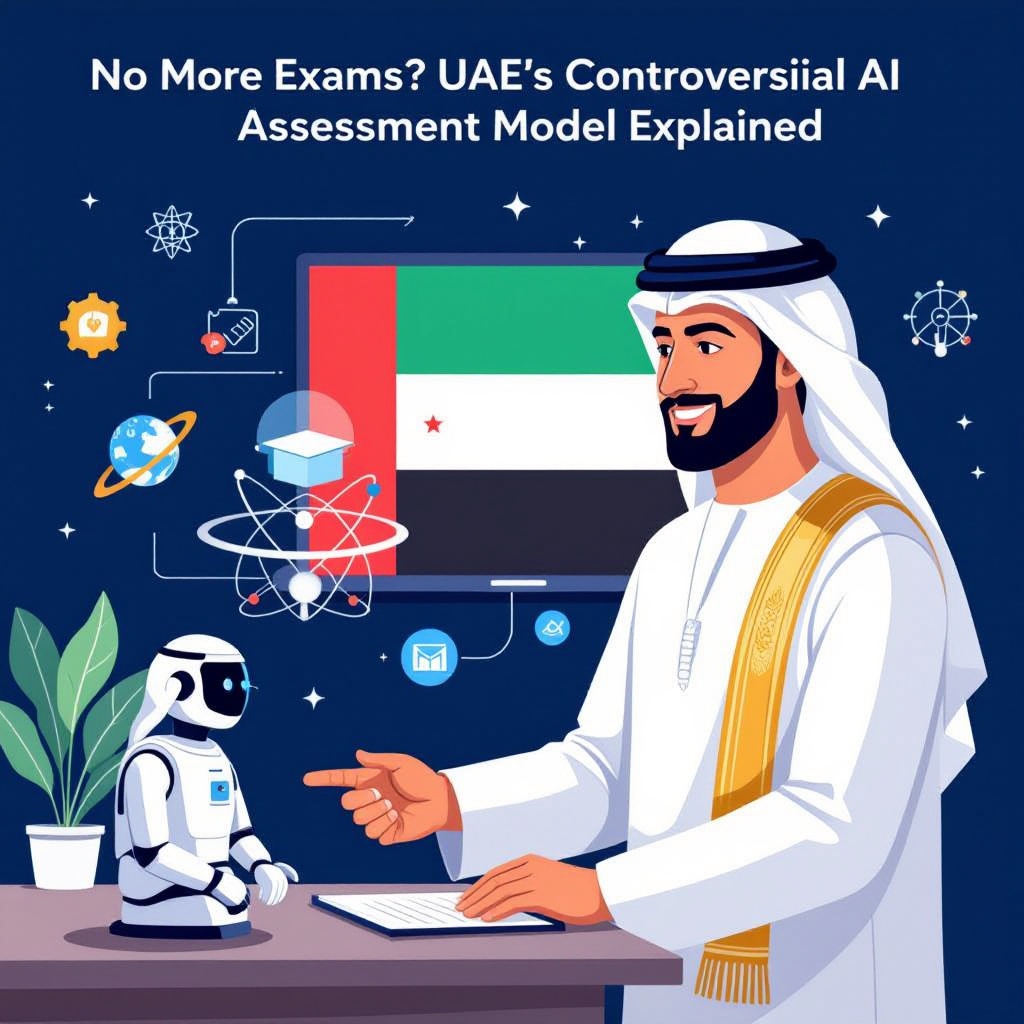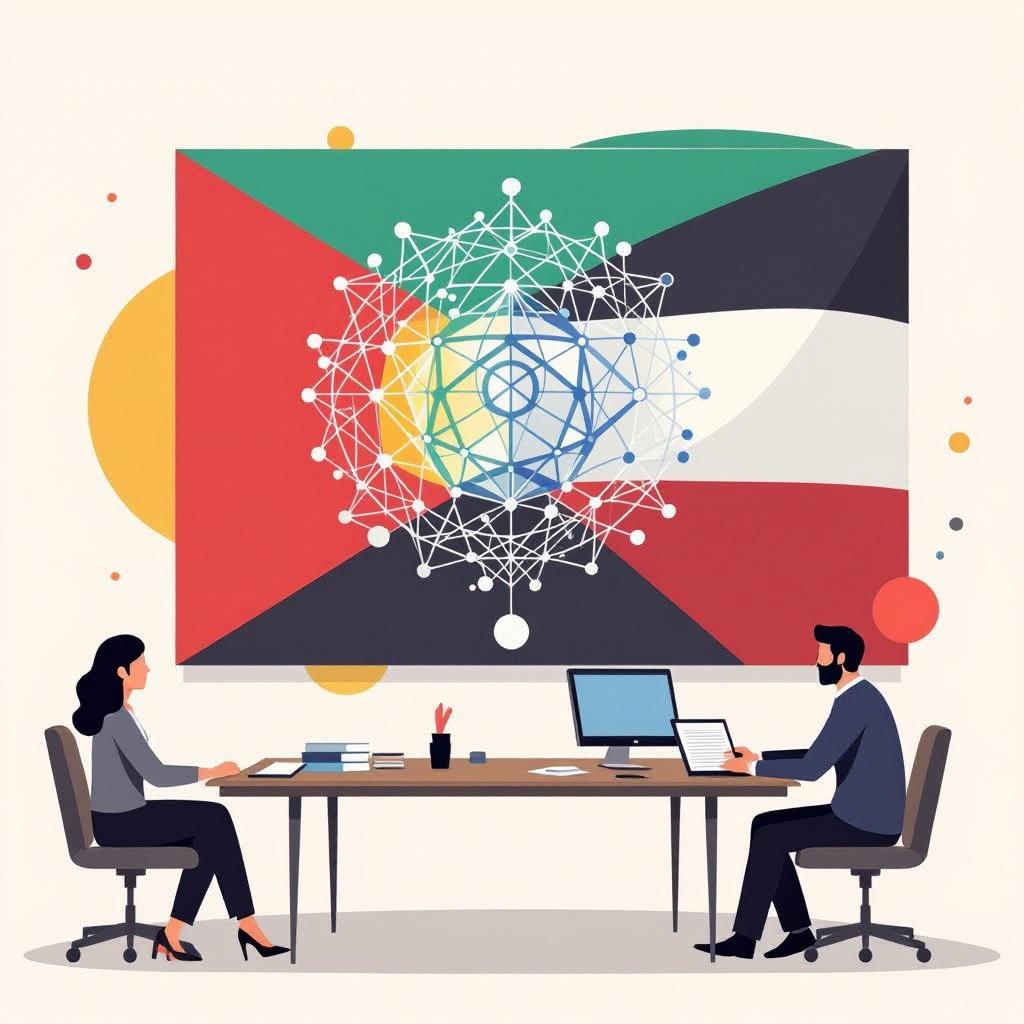The UAE is boldly stepping into the future by replacing traditional exams with an AI-driven assessment model in schools, covering kindergarten through grade 12, starting in the 2025–2026 academic year.
This forward-thinking approach embraces a flexible, skills-based evaluation system and demands extensive teacher training.
Key Takeaways
-
The UAE plans to phase out traditional exams, launching a national AI curriculum in the 2025–2026 academic year.
-
This shift to AI-driven assessments focuses on practical experience and real-world problem-solving over standard testing.
-
Nearly 1,000 teachers will undergo training to adapt to this model, shifting their roles to mentors of critical thinking and ethics.
-
The initiative aims to prepare students for an AI-driven future, prioritizing personalized learning and inclusivity in education.
-
This change raises important discussions about readiness and equity, highlighting the need for ample resource allocation and teacher support.
UAE’s Bold Move to Eliminate Traditional Exams with AI Integration
The UAE Ministry of Education has announced a groundbreaking shift in education. They’re rolling out a national AI curriculum across all public schools from kindergarten through grade 12 starting in the 2025-2026 academic year. The initiative requires training for nearly 1,000 teachers to equip them with the skills needed to implement AI-driven assessments effectively. This bold move positions the UAE at the forefront in adopting AI for educational purposes, showcasing their commitment to preparing students for an AI-powered future. If you’re curious to know how AI can transform learning, you might want to check out EdTech Magazine for further insights. The curriculum will phase out traditional exam models, aiming for a more flexible, skills-based evaluation. While this has sparked debates, there’s no denying the potential benefits in fostering an innovative learning environment.

Transforming Learning: From Traditional Exams to Project-Based Assessments
In recent times, I’ve noticed a shift in how subjects, especially AI, are taught and assessed. Gone are the days of stressful cramming for exams. Instead, schools worldwide are leaning into project-based assessments. This change puts the spotlight on hands-on experience and real-world problem-solving.
For AI learners, this means diving into projects that test their understanding in a practical way. They can showcase their knowledge on important topics like safety, ethics, and creativity, areas increasingly vital in tech-driven industries. Picture students crafting a project that demonstrates AI fundamentals and addresses ethical dilemmas AI might pose. It’s a chance to be innovative and think critically about the implications of their work.
This shift represents more than a change in assessment; it fosters a culture where learning reflects real-world applications. Students preparing for careers in tech will find this approach aligns closely with industry expectations. If you’re interested in how these innovative teaching methods compare globally, read about Finland’s educational system, which has been a pioneer in this approach for years.
For educators, adapting to project-based assessments means developing new criteria that evaluate a student’s creativity and understanding. Changing assessment models thus requires an educational shift, not only for students but also for teachers and institutions adjusting to a new age of learning. This change might just be what future generations need to thrive in their careers.

Evolution of Educator Roles and AI-Driven Training
In the UAE, the educational landscape is transforming as thousands of teachers undergo retraining for AI integration. This shift is redefining what it means to be an educator. Teachers are evolving from mere presenters of information to becoming guides and mentors. They’re now more focused on nurturing skills like critical thinking and ethical reasoning in their students.
The traditional model where a teacher is just a lecturer is becoming obsolete. Instead, as technology takes up the information delivery role, teachers can invest more time in personalized student engagement. This change requires teachers to also adopt new teaching methods. It’s not just about using AI tools but knowing how to leverage them to enhance student learning and thought processes.
By developing these new skills, educators help students develop the ability to analyze information deeply and ethically. Critical thinking becomes a cornerstone, guiding students to question, evaluate, and forge new ideas. Ethical reasoning is equally important. In an AI-driven environment, understanding moral implications ensures students can use these tools responsibly.
Training programs specifically tailored for this transition are essential. They provide resources and strategies to enable educators to adapt effectively. For those curious about the standards being set, UNESCO’s guidelines on AI in education offer a solid reference point. As educators embrace these new roles, they’re not just teaching students; they’re preparing them to thrive in an increasingly automated world.
Tools and Personalization: The Rise of AI in Classrooms
AI‘s set to revolutionize learning experiences by making education more personalized. With its integration, AI tailors lessons to individual student needs, ensuring everyone progresses at their own pace. Imagine a math tool that adapts to how you solve problems, guiding you to overcome hurdles smoothly.
AI-powered tools also automate administrative tasks. Grading? That’s a cinch now, freeing teachers to focus on teaching. These tools foster inclusivity by providing accessible learning options for all students, like voice recognition software that aids those with reading difficulties.
With AI, classrooms become spaces where every student, regardless of ability, feels included. EdTech Magazine covers AI’s profound impact on education, paving a path for transformative learning. As these changes sweep through education, embracing them ensures learning is more engaging and equitable than ever before.

Balancing Innovation with Ethical Considerations
Embracing innovation in education requires careful consideration. The UAE is stepping into a new educational mode with AI assessments, but it’s essential to cover all bases ethically. Curriculum oversight plays a crucial role here. To ensure global benchmarks are reached, collaboration with major tech firms like Microsoft is key. This partnership not only supports the system’s quality but also helps in integrating cutting-edge technology effectively.
Data privacy is at the forefront of these developments. With the increasing role of AI, safeguarding student data becomes a priority. Implementing measures that protect data ensures trust in the system, allowing educators and students to focus on learning. Inclusivity is another crucial element. AI models are being designed to provide equal learning opportunities for everyone. It’s important that these systems support diverse learning styles and needs.
Responsible AI usage is non-negotiable. If you’re building an AI system for education, it must be transparent and accountable. Ethical guidelines should always guide its development and deployment. The focus remains on benefiting students while minimizing risks. This approach doesn’t just align with best practices; it also reassures educators and parents.
Navigating through these changes involves various stakeholders. The collaboration aligns with organizations committed to advancing education while adhering to ethical standards. For insights on responsible AI practices, the Partnership on AI offers some great resources. Creating an environment that values both innovation and ethics can set a precedent in educational practices globally.
Addressing the Debate: Readiness and Equity Concerns
The shift from conventional exams has sparked a heated conversation around fairness and whether schools are prepared to transition smoothly. Some wonder if teachers have the necessary skills to leverage the AI model successfully.
Educators and policymakers must consider these key aspects to ensure a fair implementation:
- Teacher Training: Is there adequate support and development for educators to utilize AI effectively?
- Resource Allocation: Are schools getting the resources needed for this transformation, especially in underrepresented communities?
- Student Access: Does every student have equal access to technology required by the AI model?
These considerations invite stakeholders to explore resources such as EdTech Magazine that provide insights into successfully integrating technology in education. Addressing these challenges head-on will be essential for building an equitable and prepared educational environment.

Frequently Asked Questions
🤖 What is the UAE’s plan for AI in its national curriculum?
The UAE is introducing a comprehensive AI curriculum across all public schools from kindergarten through grade 12, starting in the 2025-2026 academic year. This initiative is designed to replace traditional exams with AI-driven assessments, preparing students for an AI-powered future.
📚 How will classroom assessments change with AI?
The shift to project-based assessments will move learning away from rote memorization and toward real-world problem-solving. Students will engage in hands-on projects that evaluate creativity, critical thinking, and ethical reasoning, ensuring deeper learning and skill application.
👩🏫 How are teachers being prepared for this AI transformation?
Nearly 1,000 teachers are undergoing specialized training to implement AI tools and new assessment models effectively. This retraining redefines educators’ roles to focus on personalized learning, mentoring, and ethical guidance, paving the way for a modern teaching approach.
🧠 What are the key benefits of AI-powered learning tools?
AI in the classroom enables adaptive learning by tailoring content to each student’s needs, ensuring personalized progress. Additionally, it automates tasks like grading and supports inclusive education through accessibility features such as voice recognition technology.
🔒 How is the UAE ensuring ethical use of AI in education?
The UAE is prioritizing data privacy, responsible AI use, and inclusivity in its education reforms. By collaborating with tech companies like Microsoft and referring to global standards like UNESCO’s guidelines, ethical implementation remains a foundational goal of this initiative.
⚖️ What challenges does this AI shift pose for schools?
Concerns center around teacher readiness, equitable access to technology, and sufficient resource allocation—especially in underserved communities. Addressing these challenges is key to ensuring a fair and successful transition to the AI-driven educational model.
Sources:
Plekhanov Dubai, UAE Ministry of Education to Implement Nationally Developed AI Curriculum in 2025-2026
The New Arab, UAE to introduce AI in schools from age four in tech drive
JobX Dubai Blog, UAE Teachers AI Assessment – Preparing Educators for a Digital Future
Complete AI Training, UAE Schools Launch AI Curriculum with Project-Based
Arabian Business, UAE School Reforms 2025
Atticus Education, Artificial Intelligence (AI) in UAE Public Schools
Gulf News, New UAE School Year Brings AI Curriculum, Unified Holidays and Updated Exams
GESS Education, School Improvement in the UAE and the Use of Artificial Intelligence (AI)
